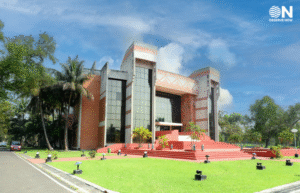Amazon Web Services (AWS) India has announced that the National Health Authority (NHA), Government e-Marketplace (GeM), and Public Sector Bank Alliance (PSBA) are adopting AWS technology to build scalable, cloud-based solutions. PSBA, an umbrella organization of 12 public sector banks, has selected AWS as their cloud service provider, allowing member banks to adopt AWS through PSBA’s Community Cloud Services without the need for separate procurement processes. AWS will provide cloud services through two Managed Service Providers (MSP) – Orient Technologies and Hitachi Systems.
By leveraging AWS’s advanced security, compliance, and governance services, banks can create a secure cloud environment that supports innovation at a low cost. The move allows for agile technology infrastructure in line with business goals and digital transformation strategies, as well as access to the technical expertise of the MSPs. Additionally, PSBA will offer software-as-a-service (SaaS) based financial marketplaces, enabling banks to deliver services like doorstep banking and manage non-performing asset (NPA) loans through platforms such as eBKray, an end-to-end listing and auction system.
The Government e-Marketplace (GeM), touted as the world’s second-largest public procurement platform, is also utilizing AWS cloud to enhance its e-procurement features, including direct purchasing, bidding, reverse auctions, price matching, and demand aggregation. With AWS’s support, GeM processes 9,000 page views per second, 1.5 million interactions daily, and manages transactions worth nearly ₹1,000 crore in gross merchandise value every day.
In the healthcare sector, AWS is helping the NHA build an open digital health ecosystem for India through programs like Ayushman Bharat-Pradhan Mantri Jan Arogya Yojana (AB-PMJAY) and Ayushman Bharat Digital Mission (ABDM). AWS technology is being used to develop critical applications such as the Beneficiary Identification System and Transaction Management System, which support the management of beneficiary identification and claim transactions for more than 550 million citizens.
In May 2023, AWS announced plans to invest an additional $12.7 billion (₹1,05,600 crore) in India by 2030, building on a prior investment of $3.7 billion between 2016 and 2022. This brings AWS’s total investment in the country to $16.4 billion (₹1,36,500 crore) by 2030, which is expected to contribute $23.3 billion (₹1,94,700 crore) to India’s GDP and support 1,31,700 full-time equivalent jobs annually in sectors such as construction, facility maintenance, engineering, and telecommunications.
“This investment is to expand the cloud infrastructure in the country. India is aiming for a $1 trillion digital economy and $5 trillion overall economy in the future, and this can be powered through cloud computing. Whether start-ups, enterprises, government, or public sector enterprises, everybody needs a massive scale of compute, network, and storage,” Pankaj Gupta, Leader – Public Sector, AWS India, said. He added that AWS provides solutions across sectors like education & skilling, healthcare, agriculture, power, and smart metering. The company also works with other government entities and education customers like the National Skill Development Corporation (NSDC), which runs its citizen-scale skilling platform on AWS, and the Swachchata App by the Ministry of Housing and Urban Affairs (MoHUA) which uses AWS technologies for powering real-time geographic information system (GIS), analytics-based dashboards, business intelligence, IoT, and drone-based monitoring of sanitation assets and Digilocker.
In the education sector, AWS is a key partner for edtech firm PhysicsWallah, helping scale its mega classrooms. Co-founder Prateek Maheshwari noted that AWS’s infrastructure has been critical in addressing challenges related to scale and cost.
AWS also collaborates with state governments like Maharashtra, Madhya Pradesh, and Telangana. For instance, Maharashtra State Electricity Distribution Company Ltd. (MSEDCL), one of the world’s largest electricity distribution companies, has migrated more than 100 applications to AWS, achieving 99.5% compliance with Service Level Agreements (SLA). Telangana has also moved its entire e-office platform and state health insurance application to AWS.

























